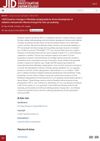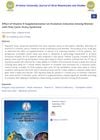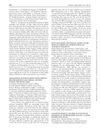 April 2023 in “Journal of Investigative Dermatology”
April 2023 in “Journal of Investigative Dermatology” Radiation treatment causes skin fibrosis by increasing certain fibroblast subpopulations, but using a c-Jun inhibitor or fat grafting can reduce this effect.
 April 2023 in “The journal of investigative dermatology/Journal of investigative dermatology”
April 2023 in “The journal of investigative dermatology/Journal of investigative dermatology” Prostaglandin E2 helps prevent hair loss from radiotherapy by protecting hair growth cells and aiding self-repair.
[object Object]  April 2023 in “The journal of investigative dermatology/Journal of investigative dermatology”
April 2023 in “The journal of investigative dermatology/Journal of investigative dermatology” Activating mitophagy may help manage a key immune response involved in the hair loss condition alopecia areata.

COVID-19 may trigger or worsen rapid hair loss in alopecia areata.

A woman regrew her hair after receiving injections of special cell-derived vesicles.
 March 2023 in “Journal of clinical pharmacy and therapeutics”
March 2023 in “Journal of clinical pharmacy and therapeutics” Isoliensinine, a natural compound, prevents stress-related hair greying by blocking a specific receptor on hair cells.
February 2023 in “Research Square (Research Square)” Dihydrotestosterone increases arterial stiffness in female mice without changing blood pressure or aortic wall thickness.
 January 2023 in “Skin Pharmacology and Physiology”
January 2023 in “Skin Pharmacology and Physiology” Minor injuries to hair follicles can stimulate hair growth in mice by increasing a specific protein.

Ganoderma lucidum extract promotes hair growth in bald rats, with higher doses producing better results, similar to the effects of Minoxidil 2%.
 January 2023 in “Skin appendage disorders”
January 2023 in “Skin appendage disorders” A woman's hair grew back after treatment for a rare hair loss caused by proton therapy.
December 2022 in “Journal of The American Academy of Dermatology” Low-dose oral minoxidil combined with topical minoxidil improves hair growth in breast cancer patients with therapy-induced hair loss.
 December 2022 in “BMC women's health”
December 2022 in “BMC women's health” The CNC® prosthetic system improved body image in breast cancer patients with hair loss from chemotherapy but did not significantly change their psychological wellbeing.
 December 2022 in “Journal of Phytonanotechnology and Pharmaceutical Sciences”
December 2022 in “Journal of Phytonanotechnology and Pharmaceutical Sciences” Ayurvedic treatment helped a woman with PCOS become pregnant and have a healthy baby.
 November 2022 in “Journal of Investigative Dermatology”
November 2022 in “Journal of Investigative Dermatology” Aging in one type of stem cell can cause aging-like changes in various organs.
 November 2022 in “The Indian journal of chest diseases & allied sciences”
November 2022 in “The Indian journal of chest diseases & allied sciences” Isoniazid can rarely cause hair loss, which is reversible after stopping the drug.
 September 2022 in “Al-Azhar University Journal of Virus Researches and Studies”
September 2022 in “Al-Azhar University Journal of Virus Researches and Studies” Taking Vitamin D with clomiphene citrate significantly improves ovulation in women with Poly Cystic Ovary Syndrome.
 September 2022 in “Concilium”
September 2022 in “Concilium” Scalp cooling effectively prevents chemotherapy-induced hair loss but requires better pain management.
August 2022 in “Ad-Dawaa' Journal of Pharmaceutical Sciences” Hibiscus rosa-sinensis L. and Baccaurea racemosa extracts help hair growth.
 August 2022 in “Acta dermato-venereologica”
August 2022 in “Acta dermato-venereologica” Propylthiouracil can cause hair loss, reduced sweating, and nail issues, but stopping the drug can reverse hair and nail problems.
 August 2022 in “The journal of investigative dermatology/Journal of investigative dermatology”
August 2022 in “The journal of investigative dermatology/Journal of investigative dermatology” Increasing type 17 collagen reduces aging signs in skin cells caused by UV light.
Non-immune dermal cells dominate, epidermal cells increase after day 9, and certain immune cells persist beyond inflammation in wound-induced hair follicle regeneration.
 July 2022 in “International Journal of Applied Pharmaceutics”
July 2022 in “International Journal of Applied Pharmaceutics” The optimized caffeine formula improved hair growth and penetrated all skin layers.
 May 2022 in “Annals of Oncology”
May 2022 in “Annals of Oncology” Photobiomodulation therapy may speed up hair regrowth after chemotherapy in the short term.
 January 2022 in “Medical research archives”
January 2022 in “Medical research archives” Taking vitamin D might improve life for MS patients and reduce skin side effects from alemtuzumab treatment.
 December 2021 in “Innovation in aging”
December 2021 in “Innovation in aging” Frailer men have a higher risk of worsening prostate problems and serious health events needing hospital care.
 November 2021 in “Research Square (Research Square)”
November 2021 in “Research Square (Research Square)” The new caffeine cream works better for hair growth than existing products.
 November 2021 in “Austin therapeutics”
November 2021 in “Austin therapeutics” Current treatments for hair loss from chemotherapy are limited, but new methods are being researched.
[object Object]  August 2021 in “Journal of Investigative Dermatology”
August 2021 in “Journal of Investigative Dermatology” Stress causes hair loss by making the body produce cortisol, which stops hair cells from growing.
 July 2021 in “Open access journal of biomedical science”
July 2021 in “Open access journal of biomedical science” A lotion with natural extracts significantly sped up hair growth in women with hair loss from chemotherapy.
May 2021 in “Kahramanmaraş Sütçü İmam Üniversitesi Tıp Fakültesi Dergisi” Most women undergoing chemotherapy experience hair loss, and many cope by using wigs or bonnets.
























